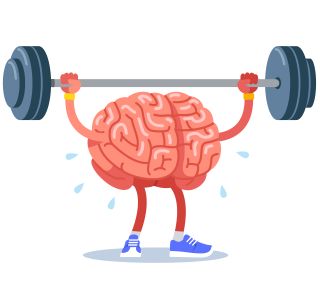Memory
How Your Workout Habits Can Fortify an "I Got This" Mindset
People who exercise regularly have stronger goal-oriented cognitive control.
Posted January 30, 2023 Reviewed by Devon Frye
Key points
- "Proactive control" is a type of top-down cognitive control characterized by staying laser-focused on achieving a goal.
- The habitual act of finishing a tough workout by not giving up or quitting halfway through requires proactive control.
- People who exercise regularly fortify top-down brainpower associated with proactive control; this mindset is transferable to other domains.

Cognitive control can be proactive or reactive. During proactive control, a goal-driven mindset keeps someone's eye on the prize while simultaneously anticipating and preventing mental blocks that might interfere with achieving a specific goal-oriented task before getting derailed.
Conversely, reactive control is a last-minute correction mechanism that kicks in after someone is caught off guard and scrambles to prevent unexpected interference from derailing a behavioral goal.
Proactive Control Flexes the Prefrontal Cortex
Accumulating evidence suggests that the prefrontal cortex is the seat of proactive control. As Todd Braver explained in a 2012 paper, "Proactive control reflects the sustained and anticipatory maintenance of goal-relevant information within [the] lateral prefrontal cortex (PFC) to enable optimal cognitive performance."
A recent study examined the relationship between higher vs. lower weekly physical activity levels and proactive control. The researchers found that among 132 university students, those who exercised regularly throughout the week tended to have more robust proactive control than their less active peers. These findings (Ren et al., 2023) were recently published in the peer-reviewed journal Psychology of Sport and Exercise.
After dividing the college-aged study participants into a "High Physical Activity" group and a "Low Physical Activity" group (High PA/Low PA) based on how much exercise someone did each week, the researchers conducted tests to measure proactive control on different cognitively demanding tasks.
People in the High PA group were much better at maintaining proactive control during a Continuous Performance Task (CPT). Notably, they could also anticipate and prevent interference from disrupting their goal-oriented mindset during a Cued Task-Switching Paradigm (CTS).
Working Memory Is Key to Proactive Control
During task-switching CTS, Ren et al. found that working memory, which relies on neural mechanisms in the prefrontal cortex, plays a significant role in modulating the association between physical activity and levels of proactive control.
These findings identify a correlation between higher weekly physical activity levels and more robust proactive control that appears to be transferable across different cognitive domains. However, because these cross-sectional findings are correlative, it's impossible to know for sure if there's a causal link between physical activity and proactive control.
That said, Ren et al. speculate that their latest (2023) findings "may have important implications for developing effective intervention strategies which aim to promote proactive control through increasing physical activity." They also note that it's important to consider individual differences in PFC-driven working memory when designing such interventions.

The Habit of Achieving Exercise Goals Strengthens Top-Down Cognitive Control
Anecdotally, it makes sense that the regular habit of achieving gym-related goals boosts proactive control.
For example, when you're lifting weights, about halfway through a set of 12 reps, if your muscles might start to burn, a little voice in your head will whisper, "This is exhausting. Let's stop right now." Often, this interference causes inexperienced gym newbies to quit. But with practice, regular gymgoers learn how to anticipate and silence subconscious urges to "throw in the towel" before they've achieved a predetermined goal by exercising proactive control.
Sustaining this goal-directed focus by blocking mental interference requires flexing the prefrontal cortex and exerting top-down cognitive control using working memory.
Over time, people who work out regularly become masters of anticipating and preventing mental blocks that stand in their way at the gym. More research is needed to pinpoint best practices for optimizing someone's "I got this" mindset at the gym in ways that make their proactive control transferable to achieving goals outside a gym environment.
References
Tian Ren, Xuejian Ye, Zheng Li, Qingyi Li, Xinyuan Zhang, Wenjie Dou, Xi Jia, Bao-ming Li, Chunjie Wang. "Associations Between Physical Activity and Proactive Control and the Modulating Role of Working Memory." Psychology of Sport and Exercise (First published: January 05, 2023) DOI: 10.1016/j.psychsport.2022.102374
Naomi P. Friedman & Trevor W. Robbins. "The Role of Prefrontal Cortex in Cognitive Control and Executive Function." Neuropsychopharmacology (First published: August 18, 2021) DOI: 10.1038/s41386-021-01132-0
Todd S. Braver. "The Variable Nature of Cognitive Control: A Dual Mechanisms Framework." Trends in Cognitive Sciences (First published: January 13, 2012) DOI: 10.1016/j.tics.2011.12.010


